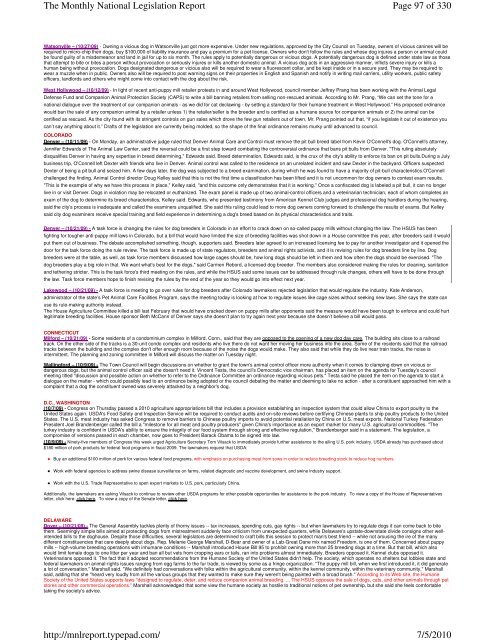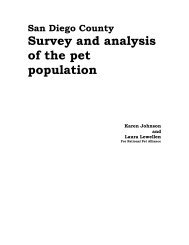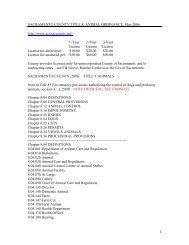Page 1 of 330 The Monthly National Legislation Report 7/5/2010 ...
Page 1 of 330 The Monthly National Legislation Report 7/5/2010 ...
Page 1 of 330 The Monthly National Legislation Report 7/5/2010 ...
You also want an ePaper? Increase the reach of your titles
YUMPU automatically turns print PDFs into web optimized ePapers that Google loves.
<strong>The</strong> <strong>Monthly</strong> <strong>National</strong> <strong>Legislation</strong> <strong>Report</strong>http://mnlreport.typepad.com/<strong>Page</strong> 97 <strong>of</strong> <strong>330</strong>7/5/<strong>2010</strong>Watsonville – (10/27/09) - Owning a vicious dog in Watsonville just got more expensive. Under new regulations, approved by the City Council on Tuesday, owners <strong>of</strong> vicious canines will berequired to micro-chip their dogs, buy $100,000 <strong>of</strong> liability insurance and pay a premium for a pet license. Owners who don't follow the rules and whose dog injures a person or animal couldbe found guilty <strong>of</strong> a misdemeanor and land in jail for up to six month. <strong>The</strong> rules apply to potentially dangerous or vicious dogs. A potentially dangerous dog is defined under state law as thosethat attempt to bite or bites a person without provocation or seriously injures or kills another domestic animal. A vicious dog acts in an aggressive manner, inflicts severe injury or kills ahuman being without provocation. Dogs designated dangerous or vicious also will be required to wear a fluorescent collar, and be kept inside or in a secure yard. <strong>The</strong>y may be required towear a muzzle when in public. Owners also will be required to post warning signs on their properties in English and Spanish and notify in writing mail carriers, utility workers, public safety<strong>of</strong>ficers, landlords and others who might come into contact with the dog about the risk.West Hollywood – (10/12/09) - In light <strong>of</strong> recent anti-puppy mill retailer protests in and around West Hollywood, council member Jeffrey Prang has been working with the Animal LegalDefense Fund and Companion Animal Protection Society (CAPS) to write a bill banning retailers from selling non-rescued animals. According to Mr. Prang, “We can set the tone for anational dialogue over the treatment <strong>of</strong> our companion animals - as we did for cat declawing - by setting a standard for their humane treatment in West Hollywood.” His proposed ordinancewould ban the sale <strong>of</strong> any companion animal by a retailer unless 1) the retailer/seller is the breeder and is certified as a humane source for companion animals or 2) the animal can becertified as rescued. As the city found with its stringent controls on gun sales which drove the few gun retailers out <strong>of</strong> town, Mr. Prang pointed out that, “if you legislate it out <strong>of</strong> existence youcan’t say anything about it.” Drafts <strong>of</strong> the legislation are currently being molded, so the shape <strong>of</strong> the final ordinance remains murky until advanced to council.COLORADODenver – (10/11/09) - On Monday, an administrative judge ruled that Denver Animal Care and Control must remove the pit bull breed label from Kevin O'Connell's dog. O'Connell's attorney,Jennifer Edwards <strong>of</strong> <strong>The</strong> Animal Law Center, said the reversal could be a first step toward combating the controversial ordinance that bans pit bulls from Denver. "This ruling absolutelydisqualifies Denver in having any expertise in breed determining," Edwards said. Breed determination, Edwards said, is the crux <strong>of</strong> the city's ability to enforce its ban on pit bulls.During a Julybusiness trip, O'Connell left Dexter with friends who live in Denver. Animal control was called to the residence on an unrelated incident and saw Dexter in the backyard. Officers suspectedDexter <strong>of</strong> being a pit bull and seized him. A few days later, the dog was subjected to a breed examination, during which he was found to have a majority <strong>of</strong> pit-bull characteristics.O'Connellchallenged the finding. Animal Control director Doug Kelley said that this is not the first time a classification has been lifted and it is not uncommon for dog owners to contest exam results."This is the example <strong>of</strong> why we have this process in place," Kelley said, "and this outcome only demonstrates that it is working." Once a confiscated dog is labeled a pit bull, it can no longerlive in or visit Denver. Dogs in violation may be relocated or euthanized. <strong>The</strong> exam panel is made up <strong>of</strong> two animal-control <strong>of</strong>ficers and a veterinarian technician, each <strong>of</strong> whom completes anexam <strong>of</strong> the dog to determine its breed characteristics, Kelley said. Edwards, who presented testimony from American Kennel Club judges and pr<strong>of</strong>essional dog handlers during the hearing,said the city's process is inadequate and called the examiners unqualified. She said this ruling could lead to more dog owners coming forward to challenge the results <strong>of</strong> exams. But Kelleysaid city dog examiners receive special training and field experience in determining a dog's breed based on its physical characteristics and traits.Denver – (10/21/09) - A task force is changing the rules for dog breeders in Colorado in an effort to crack down on so-called puppy mills without changing the law. <strong>The</strong> HSUS has beenfighting for tougher anti-puppy mill laws in Colorado, but a bill that would have limited the size <strong>of</strong> breeding facilities was shot down in a House committee this year, after breeders said it wouldput them out <strong>of</strong> business. <strong>The</strong> debate accomplished something, though, supporters said. Breeders later agreed to an increased licensing fee to pay for another investigator and it opened thedoor for the task force doing the rule review. <strong>The</strong> task force is made up <strong>of</strong> state regulators, breeders and animal rights activists, and it is revising rules for dog breeders line by line. Dogbreeders were at the table, as well, as task force members discussed how large cages should be, how long dogs should be left in them and how <strong>of</strong>ten the dogs should be exercised. "<strong>The</strong>dog breeders play a big role in that. We want what's best for the dogs," said Carmen Rebord, a licensed dog breeder. <strong>The</strong> members also considered making the rules for cleaning, sanitationand tethering stricter. This is the task force's third meeting on the rules, and while the HSUS said some issues can be addressed through rule changes, others will have to be done throughthe law. Task force members hope to finish revising the rules by the end <strong>of</strong> the year so they would go into effect next year.Lakewood – (10/21/09) - A task force is meeting to go over rules for dog breeders after Colorado lawmakers rejected legislation that would regulate the industry. Kate Anderson,administrator <strong>of</strong> the state’s Pet Animal Care Facilities Program, says the meeting today is looking at how to regulate issues like cage sizes without seeking new laws. She says the state canuse its rule-making authority instead.<strong>The</strong> House Agriculture Committee killed a bill last February that would have cracked down on puppy mills after opponents said the measure would have been tough to enforce and could hurtlegitimate breeding facilities. House sponsor Beth McCann <strong>of</strong> Denver says she doesn’t plan to try again next year because she doesn’t believe a bill would pass.CONNECTICUTMilford – (10/21/09) - Some residents <strong>of</strong> a condominium complex in Milford, Conn., said that they are opposed to the opening <strong>of</strong> a new dog day care. <strong>The</strong> building sits close to a railroadtrack. On the other side <strong>of</strong> the tracks is a 30-unit condo complex and residents who live there do not want her moving her business into the area. Some <strong>of</strong> the residents said that the railroadtracks between the building and the complex don't <strong>of</strong>fer enough room because <strong>of</strong> the noise the dogs would make. <strong>The</strong>y also said that while they do live near train tracks, the noise isintermittent. <strong>The</strong> planning and zoning committee in Milford will discuss the matter on Tuesday night.Wallingford – (10/9/09) - <strong>The</strong> Town Council will begin discussions on whether to grant the town's animal control <strong>of</strong>ficer more authority when it comes to clamping down on vicious ordangerous dogs, but the animal control <strong>of</strong>ficer said she doesn't need it. Vincent Testa, the council's Democratic vice chairman, has placed an item on the agenda for Tuesday's councilmeeting titled "discussion and possible action on whether to refer to the Ordinance Committee an ordinance regarding vicious pets." Testa said he placed the item on the agenda to start adialogue on the matter - which could possibly lead to an ordinance being adopted or the council debating the matter and deeming to take no action - after a constituent approached him with acomplaint that a dog the constituent owned was severely attacked by a neighbor's dog.D.C., WASHINGTON(10/7/09) - Congress on Thursday passed a <strong>2010</strong> agriculture appropriations bill that includes a provision establishing an inspection system that could allow China to export poultry to theUnited States again. USDA's Food Safety and Inspection Service will be required to conduct audits and on-site reviews before certifying Chinese plants to ship poultry products to the UnitedStates. <strong>The</strong> U.S. meat industry has asked Congress to remove barriers to Chinese poultry imports to avoid potential retaliation by China on U.S. meat exports. <strong>National</strong> Turkey FederationPresident Joel Brandenberger called the bill a "milestone for all meat and poultry producers" given China's importance as an export market for many U.S. agricultural commodities. "<strong>The</strong>turkey industry is confident in USDA's ability to ensure the integrity <strong>of</strong> our food system through strong and effective regulation," Brandenberger said in a statement. <strong>The</strong> legislation, acompromise <strong>of</strong> versions passed in each chamber, now goes to President Barack Obama to be signed into law.(10/9/09) - Ninety-five members <strong>of</strong> Congress this week urged Agriculture Secretary Tom Vilsack to immediately provide further assistance to the ailing U.S. pork industry. USDA already has purchased about$180 million <strong>of</strong> pork products for federal food programs in fiscal 2009. <strong>The</strong> lawmakers request that USDA:Buy an additional $100 million <strong>of</strong> pork for various federal food programs, with emphasis on purchasing meat from sows in order to reduce breeding stock to reduce hog numbers.Work with federal agencies to address swine disease surveillance on farms, related diagnostic and vaccine development, and swine industry support.Work with the U.S. Trade Representative to open export markets to U.S. pork, particularly China.Additionally, the lawmakers are asking Vilsack to continue to review other USDA programs for other possible opportunities for assistance to the pork industry. To view a copy <strong>of</strong> the House <strong>of</strong> Representativesletter, click here: click here. To view a copy <strong>of</strong> the Senate letter, click here.DELAWAREDover – (10/21/09) - <strong>The</strong> General Assembly tackles plenty <strong>of</strong> thorny issues -- tax increases, spending cuts, gay rights -- but when lawmakers try to regulate dogs it can come back to bitethem. Seemingly simple bills aimed at protecting dogs from mistreatment suddenly face criticism from unexpected quarters, while Delaware's upstate-downstate divide consigns other wellintendedbills to the doghouse. Despite those difficulties, several legislators are determined to craft bills this session to protect man's best friend -- while not arousing the ire <strong>of</strong> the manydifferent constituencies that care deeply about dogs. Rep. Melanie George Marshall, D-Bear and owner <strong>of</strong> a Lab-Great Dane mix named Freedom, is one <strong>of</strong> them. Concerned about puppymills -- high-volume breeding operations with inhumane conditions -- Marshall introduced House Bill 95 to prohibit owning more than 25 breeding dogs at a time. But that bill, which alsowould limit female dogs to one litter per year and ban all but vets from cropping ears or tails, ran into problems almost immediately. Breeders opposed it. Kennel clubs opposed it.Veterinarians opposed it. <strong>The</strong> fact that it adopted recommendations from the Humane Society <strong>of</strong> the United States didn't help. <strong>The</strong> society, which operates no shelters but lobbies state andfederal lawmakers on animal-rights issues ranging from egg farms to the fur trade, is viewed by some as a fringe organization. "<strong>The</strong> puppy mill bill, when we first introduced it, it did generatea lot <strong>of</strong> conversation," Marshall said. "We definitely had conversations with folks within the agricultural community, within the kennel community, within the veterinary community," Marshallsaid, adding that she "heard very loudly from all the various groups that they wanted to make sure they weren't being painted with a broad brush." According to its Web site, the HumaneSociety <strong>of</strong> the United States supports laws "designed to regulate, deter, and reduce companion animal breeding. ... <strong>The</strong> HSUS opposes the sale <strong>of</strong> dogs, cats, and other animals through petstores and other commercial operations." Marshall acknowledged that some view the humane society as hostile to traditional notions <strong>of</strong> pet ownership, but she said she feels comfortabletaking the society's advice.




